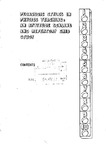PEDAGOGIC STYLES IN PHYSICS TEACHING: AN ATTITUDE SCALING AND REPERTORY GRID STUDY
| dc.contributor.author | KEEN, TERENCE R. | |
| dc.contributor.other | Faculty of Arts, Humanities and Business | en_US |
| dc.date.accessioned | 2013-10-11T10:15:23Z | |
| dc.date.available | 2013-10-11T10:15:23Z | |
| dc.date.issued | 1979 | |
| dc.identifier | NOT AVAILABLE | en_US |
| dc.identifier.uri | http://hdl.handle.net/10026.1/2175 | |
| dc.description.abstract |
The need for a greater understanding of the teaching-learning process in higher education is clearly evident from the rapid increase in research activity in this area over the last decade. Economic and political pressure often defines the rationale for such research in terms of increased efficiency; it is the author's contention that such an outcome might still result even if the emphasis is shifted towards effectiveness. Indeed it is the body of academics who are concerned with staff development that have redefined the problem in these terms. Much research has concentrated on the outcomes of the teaching-learning process in order to try and measure teaching effectiveness. Whilst it cannot be denied that these researchers have recorded some interesting observations, the author has shown that this perspective on the problem presents a less than complete picture. In the work reported in this thesis an adaptation of a Repertory Grid methodology based on the principles of Personal Construct Psychology was used primarily to examine in detail the ways in which different teachers and students perceive the roles of themselves and others in the teaching-learning process and to explore their perspectives on the range of pedagogic styles commonly utilized by the educators. The author has been able to demonstrate that groups of students and teachers who share common attitudes towards the discipline of physics are more likely to demand a common pedagogic style in order to facilitate effective, and therefore efficient learning. The development of an attitude scale enabled these groups of common attitude to be identified on four attitudinal components, ranging from exam orientation to pleasure from physics. The author investigates a number of hypotheses relating attitude and pedagogic style. The conclusions drawn from the data enable the author to make comment on the validity of a number of commonly held misconceptions within the arena of physics teaching in higher education. | en_US |
| dc.language.iso | en | en_US |
| dc.publisher | University of Plymouth | en_US |
| dc.title | PEDAGOGIC STYLES IN PHYSICS TEACHING: AN ATTITUDE SCALING AND REPERTORY GRID STUDY | en_US |
| dc.type | Thesis | |
| dc.identifier.doi | http://dx.doi.org/10.24382/3213 |
Files in this item
This item appears in the following Collection(s)
-
01 Research Theses Main Collection
Research Theses Main


